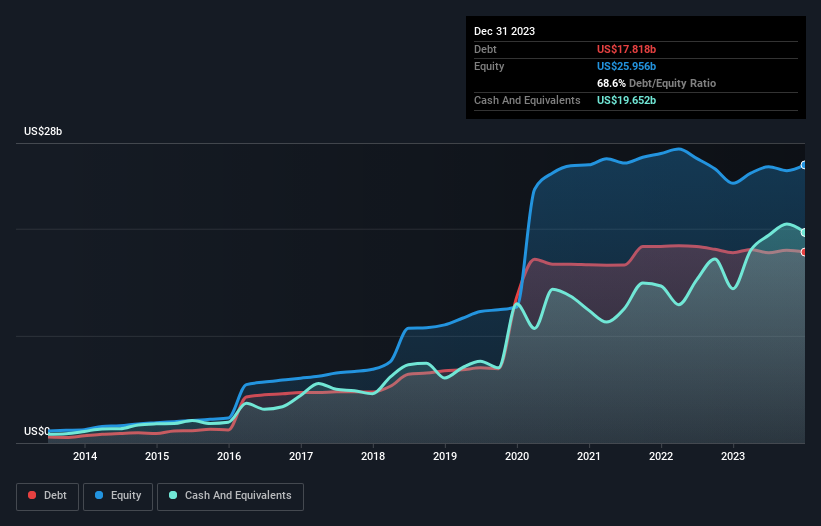- United States
- /
- Healthcare Services
- /
- NYSE:CNC
These 4 Measures Indicate That Centene (NYSE:CNC) Is Using Debt Reasonably Well

Legendary fund manager Li Lu (who Charlie Munger backed) once said, 'The biggest investment risk is not the volatility of prices, but whether you will suffer a permanent loss of capital.' So it seems the smart money knows that debt - which is usually involved in bankruptcies - is a very important factor, when you assess how risky a company is. As with many other companies Centene Corporation (NYSE:CNC) makes use of debt. But the real question is whether this debt is making the company risky.
When Is Debt A Problem?
Debt and other liabilities become risky for a business when it cannot easily fulfill those obligations, either with free cash flow or by raising capital at an attractive price. Part and parcel of capitalism is the process of 'creative destruction' where failed businesses are mercilessly liquidated by their bankers. While that is not too common, we often do see indebted companies permanently diluting shareholders because lenders force them to raise capital at a distressed price. By replacing dilution, though, debt can be an extremely good tool for businesses that need capital to invest in growth at high rates of return. The first step when considering a company's debt levels is to consider its cash and debt together.
Check out our latest analysis for Centene
What Is Centene's Net Debt?
The chart below, which you can click on for greater detail, shows that Centene had US$17.8b in debt in December 2023; about the same as the year before. But it also has US$19.7b in cash to offset that, meaning it has US$1.83b net cash.

A Look At Centene's Liabilities
According to the last reported balance sheet, Centene had liabilities of US$36.7b due within 12 months, and liabilities of US$22.0b due beyond 12 months. Offsetting this, it had US$19.7b in cash and US$15.5b in receivables that were due within 12 months. So its liabilities total US$23.5b more than the combination of its cash and short-term receivables.
This deficit isn't so bad because Centene is worth a massive US$40.5b, and thus could probably raise enough capital to shore up its balance sheet, if the need arose. However, it is still worthwhile taking a close look at its ability to pay off debt. While it does have liabilities worth noting, Centene also has more cash than debt, so we're pretty confident it can manage its debt safely.
Fortunately, Centene grew its EBIT by 9.3% in the last year, making that debt load look even more manageable. There's no doubt that we learn most about debt from the balance sheet. But ultimately the future profitability of the business will decide if Centene can strengthen its balance sheet over time. So if you're focused on the future you can check out this free report showing analyst profit forecasts.
Finally, while the tax-man may adore accounting profits, lenders only accept cold hard cash. Centene may have net cash on the balance sheet, but it is still interesting to look at how well the business converts its earnings before interest and tax (EBIT) to free cash flow, because that will influence both its need for, and its capacity to manage debt. Over the last three years, Centene actually produced more free cash flow than EBIT. That sort of strong cash generation warms our hearts like a puppy in a bumblebee suit.
Summing Up
Although Centene's balance sheet isn't particularly strong, due to the total liabilities, it is clearly positive to see that it has net cash of US$1.83b. And it impressed us with free cash flow of US$7.3b, being 119% of its EBIT. So we don't have any problem with Centene's use of debt. Of course, we wouldn't say no to the extra confidence that we'd gain if we knew that Centene insiders have been buying shares: if you're on the same wavelength, you can find out if insiders are buying by clicking this link.
If, after all that, you're more interested in a fast growing company with a rock-solid balance sheet, then check out our list of net cash growth stocks without delay.
New: AI Stock Screener & Alerts
Our new AI Stock Screener scans the market every day to uncover opportunities.
• Dividend Powerhouses (3%+ Yield)
• Undervalued Small Caps with Insider Buying
• High growth Tech and AI Companies
Or build your own from over 50 metrics.
Have feedback on this article? Concerned about the content? Get in touch with us directly. Alternatively, email editorial-team (at) simplywallst.com.
This article by Simply Wall St is general in nature. We provide commentary based on historical data and analyst forecasts only using an unbiased methodology and our articles are not intended to be financial advice. It does not constitute a recommendation to buy or sell any stock, and does not take account of your objectives, or your financial situation. We aim to bring you long-term focused analysis driven by fundamental data. Note that our analysis may not factor in the latest price-sensitive company announcements or qualitative material. Simply Wall St has no position in any stocks mentioned.
About NYSE:CNC
Centene
Operates as a healthcare enterprise that provides programs and services to under-insured and uninsured families, and commercial organizations in the United States.
Very undervalued with solid track record.
Similar Companies
Market Insights
Community Narratives


